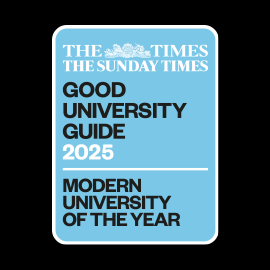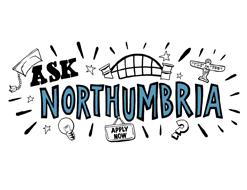-
Study
-
Quick Links
- Course Search
- Fees and Funding
- Unlock Your Potential
- Still time to Apply
- Higher and Degree Apprenticeships
- Continuing Professional Development
- Still time to apply
-
Undergraduate
- Application Guides
- UCAS Exhibitions
- Foundation Years
- School & College Outreach
- Information for Parents
-
Postgraduate
- Application Guide
- Postgraduate Research Degrees
- Flexible Learning
- Change Direction
- Register your Interest
-
-
International
International
Northumbria’s global footprint touches every continent across the world, through our global partnerships across 17 institutions in 10 countries, to our 277,000 strong alumni community and 150 recruitment partners – we prepare our students for the challenges of tomorrow. Discover more about how to join Northumbria’s global family or our partnerships.
View our Global Footprint-
Quick Links
- Course Search
- Undergraduate Study
- Postgraduate Study
- Information for Parents
- London Campus
- Northumbria Pathway
- Cost of Living
- Sign up for Information
-
International Students
- Information for Students
- International Events
- Application Guide
- Entry Requirements and Education Country Agents
- Global Offices
- English Requirements
- English Language Centre
- International student support
- Cost of Living
-
International Fees and Funding
- International Undergraduate Fees
- International Undergraduate Funding
- International Masters Fees
- International Masters Funding
- International Postgraduate Research Fees
- International Postgraduate Research Funding
-
International Partners
- Agent and Representatives Network
- Global Partnerships
- Global Community
-
International Mobility
- Information for Northumbria Students
- Information for Incoming Exchange Students
-
-
Business
Business
The world is changing faster than ever before. The future is there to be won by organisations who find ways to turn today's possibilities into tomorrows competitive edge. In a connected world, collaboration can be the key to success.
More on our Business Services -
Research
Research
Northumbria is a research-rich, business-focused, professional university with a global reputation for academic quality. We conduct ground-breaking research that is responsive to the science & technology, health & well being, economic and social and arts & cultural needs for the communities
Discover more about our Research -
About Us
-
About Northumbria
- Our Strategy
- Our Staff
- Place and Partnerships
- Leadership & Governance
- Academic Departments
- University Services
- History of Northumbria
- Contact us
- Online Shop
-
-
Alumni
Alumni
Northumbria University is renowned for the calibre of its business-ready graduates. Our alumni network has over 246,000 graduates based in 178 countries worldwide in a range of sectors, our alumni are making a real impact on the world.
Our Alumni - Work For Us
What will I learn on this module?
This module introduces students to the core skills and ideas of narration. Semester 1 mainly focuses on the structure and techniques of prose fiction. In Semester 2 this is broadened to a wider range of narrative forms, including script. Students will be introduced to a variety of basic key skills related to storytelling, will learn to appreciate the demands of different narrative genres, and will develop an understanding of the nature of story and narrative. This will provide students with a basic framework to underpin the development of their writing practice.
How will I learn on this module?
The module is taught via a combination of lectures and workshops:
1 x 1.5 hour fortnightly lecture
1 x 1.5 fortnightly workshop
Lectures provide an overview of a variety of narrative forms, topics and techniques, with straightforward explanations of complex issues.
Workshops allow you to discuss challenging material with other students under the guidance of the module tutor and to develop your skills in writing and feedback. These sessions encourage you to engage with the material presented in the lectures and to explore your own responses critically and creatively. Workshop discussions develop intellectual, practical and transferable skills.
The aim of this introductory module is to create a supportive environment in which your knowledge, confidence, creative and critical skills can develop.
The module makes appropriate use of technology enhanced learning through use of the Blackboard electronic learning platform and the online support offered by Northumbria’s SkillsPlus programme.
In addition to the scheduled lectures and seminars, you are expected to undertake both directed and independent learning. Directed learning includes preparation for lectures and workshops (including both reading and written work) individually or in small groups. Independent learning includes further reading and investigation, the consolidation of seminar materials, and revision/preparation for the module assignments.
How will I be supported academically on this module?
Your learning will be academically supported by peer and tutor feedback on your work within writing workshops as well as tutor-led debates around narrative theory and the key techniques of prose fiction writing; your tutor will facilitate set writing exercises and help trigger new work and provide tutorial support.
The module handbook provides details of lectures, seminars, reading lists and assessment criteria; lecture PowerPoint slides are made available on the e-learning platform, together with links to relevant skills materials in the library.
The module tutor is available in lectures and seminars, as well as during office hours, to discuss any queries or concerns you have.
Feedback in workshops and on the first summative assessment serves as ‘feed forward’, giving guidance on how to improve during the module. The second piece of assessment encourages you to reflect on feedback from the first.
You are advised to see your Guidance Tutor at least twice each semester to review your academic progress. The Guidance Booklet, which you receive at the start of your first year, includes structured materials designed to help you develop your self-reflection skills. These materials underpin the academic side of the regular Guidance meetings, helping you to learn how to best use the feedback you receive on your assignments, how to build on your strengths, and improve in the areas where you could perform better.
What will I be expected to read on this module?
All modules at Northumbria include a range of reading materials that students are expected to engage with. Online reading lists (provided after enrolment) give you access to your reading material for your modules. The Library works in partnership with your module tutors to ensure you have access to the material that you need.
What will I be expected to achieve?
Knowledge & Understanding:
• Develop an understanding of the nature of story and narrative.
• Gain an appreciation of the demands of different narrative genres.
Intellectual / Professional skills & abilities:
• Achieve a variety of basic key skills related to storytelling, e.g. character portrayal, plotting.
• Develop critical judgment and editing skills.
Personal Values Attributes (Global / Cultural awareness, Ethics, Curiosity) (PVA):
• Sensitivity and effectiveness when giving and receiving critical feedback in a group context.
How will I be assessed?
Formative: Group workshops for producing, sharing and critiquing creative writing. MLO5
Portfolio 1 (50% summative): A creative piece and reflective essay together totalling 1500 words or equivalent. MLO 1-4.
Portfolio 2 (50% summative): A creative piece and reflective essay together totalling 1500 words or equivalent. MLO 1-4.
Feedback will be provided using the Departmental template and comments on the script.
Pre-requisite(s)
N/A
Co-requisite(s)
N/A
Module abstract
Please find details of this module in the other sections provided.
Course info
UCAS Code QW38
Credits 20
Level of Study Undergraduate
Mode of Study 3 years Full Time or 4 years with a placement (sandwich)/study abroad
Department Humanities
Location City Campus, Northumbria University
City Newcastle
Start September 2025 or September 2026
All information is accurate at the time of sharing.
Full time Courses are primarily delivered via on-campus face to face learning but could include elements of online learning. Most courses run as planned and as promoted on our website and via our marketing materials, but if there are any substantial changes (as determined by the Competition and Markets Authority) to a course or there is the potential that course may be withdrawn, we will notify all affected applicants as soon as possible with advice and guidance regarding their options. It is also important to be aware that optional modules listed on course pages may be subject to change depending on uptake numbers each year.
Contact time is subject to increase or decrease in line with possible restrictions imposed by the government or the University in the interest of maintaining the health and safety and wellbeing of students, staff, and visitors if this is deemed necessary in future.
Useful Links
Find out about our distinctive approach at
www.northumbria.ac.uk/exp
Admissions Terms and Conditions
northumbria.ac.uk/terms
Fees and Funding
northumbria.ac.uk/fees
Admissions Policy
northumbria.ac.uk/adpolicy
Admissions Complaints Policy
northumbria.ac.uk/complaints















